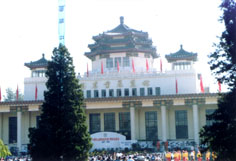 |
The Chinese Agricultural Museum is a national specialized museum. Located at the eastern section of the 3rd Ring Road, the museum was prepared in 1983 and opened to the public in September 1986.
Its total exhibition acreage reaches 8.000 square meters. Boasting more than 10,000 pieces of treasured items, the basic exhibitions of China Agriculture include the Exhibition of Chinese History of Ancient Agricultural Science & Technology, the Exhibition of Agricultural Resources Area Divisions, and the Exhibition of Aquatic Products.
The Exhibition of Chinese History of Ancient Agricultural Science & Technology introduces artifacts from of the Neolithic Age to the situation of Chinese agriculture in the 1840s, including 6,900-year-old rice seeds and bone spade unearthed in the Hemudu Culture in Yuyao of Zhejiang Province.
The Exhibition of Agricultural Resources Area Divisions introduces China's natural conditions and agricultural resources, economic conditions of the agricultural society, biological systems of agriculture and agricultural divisions. It displays over 5,000 specimens, including tree samples of golden larch, Taiwan fir, Chinese cypress, metasequoia, gingkgo and Cathaya argyrophylla; samples of crops such as grain, cotton, sesame, hemp, silk, tea, sugar, vegetable, tobacco, fruit, herbal medicine and flower, etc.
Besides wildlife samples, the animal specimens also include various rare animal specimens like the world famous panda, golden fur monkey, twisted horn antelope, spotted bears, red-crowned cranes and etc. The museum also exhibits lots of the specimens of animals and birds in excellent variety as well as more than 800 pest specimens.
The Exhibition of Aquatic Products is arranged in three halls: freshwater fishery, sea fishery and breeding of freshwater fish. The aquariums in the hall of freshwater fishery house more than 50 live fishes, including the world-famous carp of the Yellow River, chum salmon from the northeast and sturgeon from Xinjiang, etc.
The exhibits of the museum include an interesting collection of specimens, including a Chinese sturgeon living in the same period with dinosaurs, and a long-proboscis dolphin of 95 kilograms, a giant sleeve-fish of 15 kilograms, a giant turtle of 150 kilograms, and a finkback of 7.55 meters in length and 5 tons in weight.
The museum also has over 10,000 agricultural books.